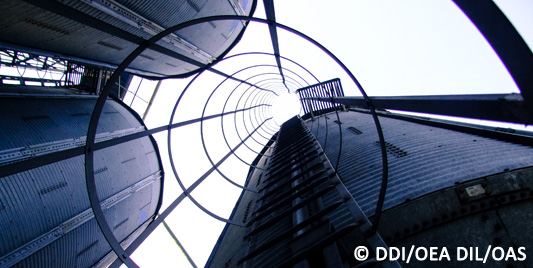
Secured lending is an important pillar for
economic growth and development; it opens up
access to credit, especially for large sectors
of the population that do not own land to use as
collateral and consequently are unable to obtain
credit at all or only at very high rates of
interest. Modernization of the laws that enable
secured financing is therefore essential as has
been recognized by the OAS General Assembly (International
Law, AG/RES. 2909). In furtherance of the
ongoing mandate to the Department of
International Law (DIL) to promote the
Model Inter-American Law on Secured Transactions,
the following recent activities are brought to
the attention of those who wish to stay abreast
of relevant developments in the field as
relevant to the Americas.
The Department was invited to participate in the
Third Conference on International Coordination
of Secured Transactions Law Reforms: “Advancing
Reforms Globally and in Latin America Through
Enhanced Coordination” held February 12–13, 2020
in Colombia and in the subsequent Workshop:
“Harmonization of Secured Transactions Law and
Implementation of Reforms in Latin America” on
February 14th. Featured speakers included the
Secretary of the United Nations Commission on
International Trade Law (UNCITRAL), the
Secretary General of the Institute for the
Unification of Private Law (UNIDROIT),
high-level officials of the World Bank Group,
plus numerous government officials, legal
practitioners, and academics. The Conference was
co-organized by the International Insolvency
Institute, Kozolchyk National Law Center,
Universidad de los Andes and Universidad
Externado de Colombia with sponsorship from the
World Bank Group and others. This was the third
conference to consider enhanced coordination
among entities engaged in secured transactions
reforms and was a follow-up to discussions held
at the first one in
Philadelphia in 2017 and the second in
Madrid in 2018. The subsequent Workshop,
which was co-hosted by UNCITRAL, UNIDROIT and
Confecámaras, featured a keynote address by the
Minister of Justice and Law of Colombia. Its
focus was on domestic implementation in the
region; panelists discussed Colombia’s reforms
and statistics that evidence positive impacts on
access to credit, and recent reform initiatives
by other states, such as Peru,1
among others2.
In November 2019, a new instrument referred to
as the “MAC Protocol” was adopted at the
UNIDROIT diplomatic conference with the
participation of representatives from over 40
States and various international entities. The
Protocol (i.e., the Convention on
International Interests in Mobile Equipment on
Matters specific to Mining, Agricultural and
Construction Equipment) will provide
businesses in the mining, agriculture, and
construction sectors the ability to acquire
equipment that they would not have otherwise
been able to buy or lease and thereby optimize
productivity and profitability. It is expected
to be of particular interest to those states
with growing commercial activities in these
three sectors. The Protocol is an extension of
the 2001 “Cape Town Convention” (i.e.,
Convention on International Interests in Mobile
Equipment, with 80 Contracting Parties),
which has already been extended to other types
of large mobile equipment (Aircraft Objects
2001, Railway Rolling Stock 2007 and Space
Assets 2012). A number of OAS Member States are
parties to the Convention and the Aircraft
Protocol; Paraguay was the first OAS Member
State to sign the new MAC Protocol.
In October 2019, the United States of America
ratified the United Nations Convention on the
Assignment of Receivables in International Trade
(New York, 2001). This represents the second
ratification, with three additional required for
the Convention to enter into force. Although the
Receivables Convention predates the Model Laws
on Secured Transactions of both UNCITRAL (2016)
and the OAS (2002), all of these instruments
enable receivables finance and should be
considered collectively to facilitate improved
access to credit at lower cost. The Convention
minimizes legal impediments by validating
assignments of future receivables3
and bulk assignments, enhancing certainty
in crucial technical matters and clarifying the
law applicable to key issues, such as priority.
The Convention applies to international
assignments and assignments of international
receivables complementing the domestic rules.
Over the past several years, DIL has been collaborating with the University of Cadiz in the compilation of a monograph on the
Model Inter-American Law on Secured Transactions, which comprises annotated articles and reports on the status of reforms in various states in the region. The monograph is in the final stages of completion and is expected to be published shortly.
What these various activities illustrate is the inter-connectivity among a number of initiatives to improve secured lending and the need for DIL “to continue promoting among member states further dissemination of private international law, in collaboration with organizations engaged in this area” (International Law, AG/RES. 2930).
---------------------------
1 Legislative Decree No. 1400 of September 10th 2018 provides for a new secured transactions regime in Peru while Supreme Decree No. 243-2019/EF of August 3rd 2019 entails the relevant regulations. However, Leg. Dec. No. 1400 will only come into force once the SIGM (Sistema Informativo de Garantías Mobiliarias) (Information System on Secured Transactions) databases have been made functional by SUNARP (Superintendencia Nacional de los Registros Públicos) (National Superintendence of Public Records), which is expected to occur within the year.
2 The Dominican Republic is the most recent OAS Member State to have approved legislative reforms on the subject. The Law on Secured Transactions was approved on its second reading in the
Senate on February 10, 2020.
3 A
“receivable” – i.e., a debt owed by another
party to the holder – has value and can
therefore serve as an asset to be used as
“security” (collateral) in debt financing.
For further information on this matter, please contact the Department of International Law of the Secretariat for Legal Affairs of the OAS +1 202 370 0743.